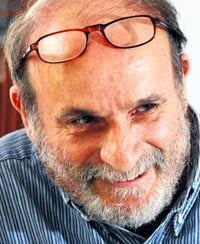One thing is however certain: Justice and Development Party (AKP) leader Tayyip Erdogan albeit having gained 363 of 550 seats in the parliament with 34.41 percent of national vote last week will not be the prime minister, as he is not a deputy at all.
Who will Turkish president Ahmet Necdet Sezer task with forming the new cabinet is still uncertain. It is expected that the president will point to another AKP deputy after a summit with Erdogan this week, though Sezer prior to elections had refuted that AKP leader, with no mandate, would have a say on the government.
The names of Abdullah Gul, former deputy prime minister in Necmettin Erbakan's pro-Islamist cabinet of 1995, Vecdi Gonul, former governor of capital Ankara and Abdulkadir Aksu, the former interior minister of Mesut Yilmaz's cabinet in 1992, are circulated as the prospective prime minister.
He might still have a long way to pass through Turkey's labyrinth of bans and prohibitions to assume the post of prime minister, but Erdogan's real political power seems to have been least affected from these formalities.
Leaving the country with an ordinary Turkish passport on Wednesday, Erdogan is welcomed in Rome by Italian Prime Minister Silvio Berlusconi as Turkey's de-facto prime minister. The AKP leader expects to press Turkey's bid to join the European Union as well as displaying the West European public opinion that his party does not back an Islamic agenda.
His visit to Rome, and scheduled visits to Turkey's neighbor Greece, and Spain next week, alongside lobbying for Turkey's EU bid, also stresses Erdogan's will to remain at the head of the course of Turkish politics and diplomacy notwithstanding legal formalities.
Erdogan's visit has prompted reactions from current Prime Minister Bulent Ecevit who questions Erdogan's capacity to represent the country. "I wonder under what capacity he has been visiting heads of government's of other countries," Ecevit Wednesday told journalists. "This is very harmful."
Ecevit has also harshly criticized Erdogan for his previous statements of prospective solutions for the Cyprus question for "undermining Turkey's national policies."
However, contrary to Ecevit's skepticism, bans and prohibitions against Erdogan seem to add to his popularity. According to a recent poll by Verso Research Company 73 percent of the interviewed backs Erdogan's prime ministry. Conducted in 14 regions with 2,138 interviews, the poll also shows that the AKP's public support too has increased to 38 percent.
Their present majority in the parliament gains Erdogan's AKP unprecedented power in passing any legislation and only a few votes short of two-thirds majority to pass Constitutional amendments.
Deniz Baykal's CHP, the only opposition party in the parliament (Republican People's Party) with 178 seats, too seems willing to find a solution to clear off the "prime ministerial problem". But "the constitution and laws should not be amended for personal purposes" says Baykal, echoing president Sezer's similar statements last week.
Erdogan, under a controversial Higher Election Council decision, had been excluded from the Nov. 3 general elections. According to Turkish Election Laws, citizens who have been sentenced for "crimes against the state" are stripped of the right to run for the parliament.
Albeit Article 312 of the Turkish Penal Code, according to which Erdogan was sentenced to 10 months in 1998 was recently amended, High Court of Appeals, prior to elections, returned Erdogan's appeal that his record should have been cleared to run for elections.
One of the "solutions" sought by the AKP to place Erdogan at the head of the cabinet is to amend Article 109 of the Turkish Constitution. This article provides that "the president appoints one of the deputies to form the cabinet."
The AKP decision makers expect that an amendment in the article to enlarge the clause to include "or a person from without the parliament" would solve the question without much strife.
However, law specialists argue that an amendment in that direction would collide with Turkey's parliamentary system what is based on the supremacy of the parliament and accountability of the elected under popular vote.
CHP leader Deniz Baykal, in a Wednesday public statement says, "a constitutional amendment unless it comprises of a larger 'package' to include cutting down the present election intervals from 5 years to 4 and restricting the parliamentary immunity to freedom of speech, is out of our agenda."
Prof. Zafer Uskul of Istanbul's Yeditepe University criticizes the court decision to exclude Erdogan from elections as"a legal error".
"The amendment in Article 312 of the penal code should have already cleared off Erdogan's records as it annulled the former designation of the 'crime' in that article," Uskul told IPS.
Nevertheless Uskul is also critical of the piecemeal amendments in the Constitution to fit momentary and accidental needs.
"The only reasonable amendment to overcome the present difficulties is to cut the election intervals from 5 years to 4 and, reducing the present limit for by-elections from 30 months following the general elections to 6 months," Uskul believes. "Then Erdogan might assume the prime ministry with least legal dispute."
However, the constitutional law expert Uskul is of the opinion that "What we need is a thorough amendment in the present Constitution, to cover the impunity of government officers, trade union rights, independence of the judges from the government, presidential powers, and emergency case rule." (EK/NM)









